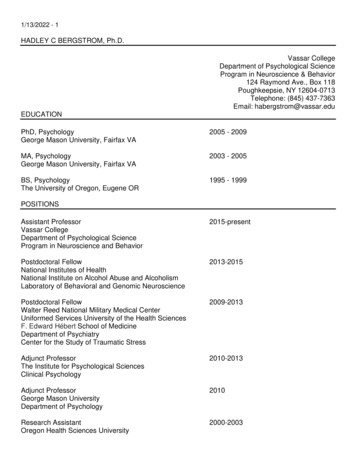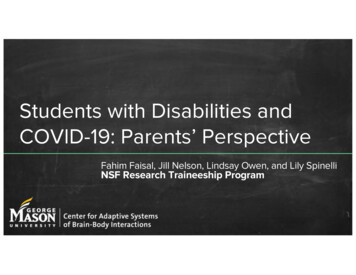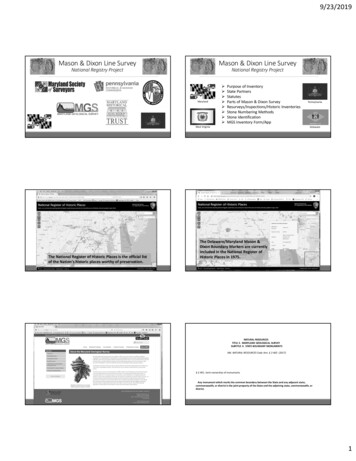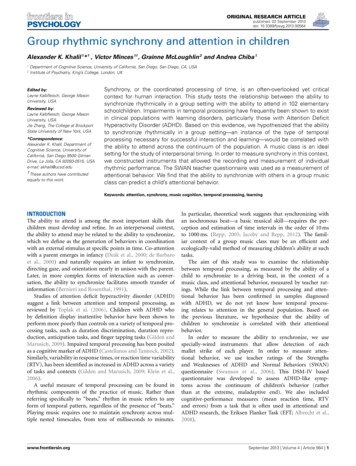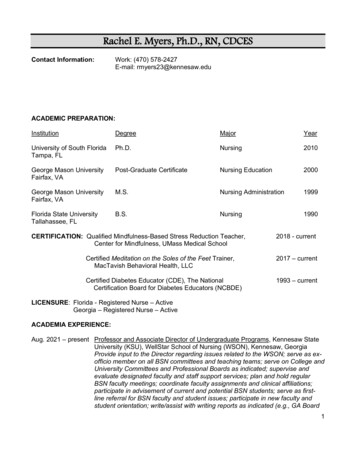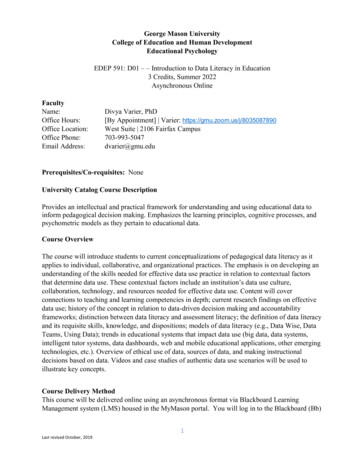
Transcription
George Mason UniversityCollege of Education and Human DevelopmentEducational PsychologyEDEP 591: D01 – – Introduction to Data Literacy in Education3 Credits, Summer 2022Asynchronous OnlineFacultyName:Office Hours:Office Location:Office Phone:Email Address:Divya Varier, PhD[By Appointment] Varier: https://gmu.zoom.us/j/8035087890West Suite 2106 Fairfax requisites: NoneUniversity Catalog Course DescriptionProvides an intellectual and practical framework for understanding and using educational data toinform pedagogical decision making. Emphasizes the learning principles, cognitive processes, andpsychometric models as they pertain to educational data.Course OverviewThe course will introduce students to current conceptualizations of pedagogical data literacy as itapplies to individual, collaborative, and organizational practices. The emphasis is on developing anunderstanding of the skills needed for effective data use practice in relation to contextual factorsthat determine data use. These contextual factors include an institution’s data use culture,collaboration, technology, and resources needed for effective data use. Content will coverconnections to teaching and learning competencies in depth; current research findings on effectivedata use; history of the concept in relation to data-driven decision making and accountabilityframeworks; distinction between data literacy and assessment literacy; the definition of data literacyand its requisite skills, knowledge, and dispositions; models of data literacy (e.g., Data Wise, DataTeams, Using Data); trends in educational systems that impact data use (big data, data systems,intelligent tutor systems, data dashboards, web and mobile educational applications, other emergingtechnologies, etc.). Overview of ethical use of data, sources of data, and making instructionaldecisions based on data. Videos and case studies of authentic data use scenarios will be used toillustrate key concepts.Course Delivery MethodThis course will be delivered online using an asynchronous format via Blackboard LearningManagement system (LMS) housed in the MyMason portal. You will log in to the Blackboard (Bb)Last revised October, 20191
course site using your Mason email name (everything before @masonlive.gmu.edu) and emailpassword. The course site will be available on May 23, 2022.Under no circumstances, may candidates/students participate in online class sessions (eitherby phone or Internet) while operating motor vehicles. Further, as expected in a face-to-faceclass meeting, such online participation requires undivided attention to course content andcommunication.Technical RequirementsTo participate in this course, students will need to satisfy the following technical requirements: High-speed Internet access with standard up-to-date browsers. To get a list of Blackboard’ssupported browsers ing Started/Browser Support#supportedbrowsersTo get a list of supported operation systems on different devices ing Started/Browser Support#tested-devicesand-operating-systems Students must maintain consistent and reliable access to their GMU email and Blackboard,as these are the official methods of communication for this course.Students may be asked to create logins and passwords on supplemental websites and/or todownload trial software to their computer or tablet as part of course requirements.The following software plug-ins for PCs and Macs, respectively, are available for freedownload: [Add or delete options, as desire.]o Adobe Acrobat Reader: https://get.adobe.com/reader/o Windows Media 209/get-windows-media-playero Apple Quick Time Player: www.apple.com/quicktime/download/Expectations Course Week: Because asynchronous courses do not have a “fixed” meeting day, our weekwill start on Monday, and finish on Sunday. Course materials will be released early onSaturdays to facilitate planning for the week.Log-in Frequency:Students must actively check the course Blackboard site and their GMU email forcommunications from the instructor, class discussions, and/or access to course materials atleast 4 times per week.Participation:Students are expected to actively engage in all course activities throughout the semester,which includes viewing all course materials, completing course activities and assignments,and participating in course discussions and group interactions. Each week, you will readLast revised October, 20192
approximately 30 pages, complete online activities, work on assignments to be submittedthrough Blackboard, and take quizzes. Technical Competence:Students are expected to demonstrate competence in the use of all course technology.Students who are struggling with technical components of the course are expected to seekassistance from the instructor and/or College or University technical services.Technical Issues:Students should anticipate some technical difficulties during the semester and should,therefore, budget their time accordingly. Late work will not be accepted based on individualtechnical issues.Workload:Please be aware that this course is not self-paced. Students are expected to meet specificdeadlines and due dates listed in the Class Schedule section of this syllabus. It is thestudent’s responsibility to keep track of the weekly course schedule of topics, readings,activities and assignments due.Instructor Support:Students may schedule a one-on-one meeting to discuss course requirements, content orother course-related issues. Those unable to come to a Mason campus can meet with theinstructor via telephone or web conference. Students should email the instructor to schedulea one-on-one session, including their preferred meeting method and suggested dates/times.Netiquette:The course environment is a collaborative space. Experience shows that even an innocentremark typed in the online environment can be misconstrued. Students must always re-readtheir responses carefully before posting them, so as others do not consider them as personaloffenses. Be positive in your approach with others and diplomatic in selecting your words.Remember that you are not competing with classmates, but sharing information and learningfrom others. All faculty are similarly expected to be respectful in all communications.Accommodations:Online learners who require effective accommodations to insure accessibility must beregistered with George Mason University Disability Services.Course LogisticsAccess to MyMason and Mason email are required to participate successfully in this course. Checkthe IT Support Center website. Please make sure to update your computer and prepare yourself tobegin using the online format BEFORE the first day of class. Read the information under“Technical Requirements” above.Though the delivery method is entirely online, it should take you the same amount of time as other3-credit courses. You should expect to spend an average of 8 to 10 hours on coursework foreach class session (this includes the time you would have spent in a classroom). Also, we have 2-3sessions fewer because of the condensed time as compared to a semester.Learner Outcomes or ObjectivesLast revised October, 20193
This course forms a foundation for the data literacy certificate courses in the sequence. As such, itwill inform educators of the importance and role of data-driven decision-making (DDDM) toimprove teaching and learning.The certificate learner outcomes are:o SLO 1: Understand current trends in educational data and ethical use of data relevantto an educational context.o SLO 2: Apply knowledge of characteristics of educational data to conduct dataanalysis and interpretation.o SLO 3: Demonstrate understanding of critical issues related to the role of educationaldata use as related to social justice, collaboration, ethical leadership, innovation, andresearch based practice.Emphasis is placed on the learning principles, cognitive processes, and psychometric principles asthey pertain to instructional and assessment issues. Students should have a working knowledge ofpotential data sources and existing data from classrooms, schools, or at the district level.By the end of this asynchronous online course students will be able to:o Identify how data-driven decision-making is implied or made explicit in federal statutes andstate assessment programs, particularly for the state where employed.o Explain the differences between the conceptual frameworks underlying classroom andsystem level assessment and non-assessment data.o Explain how data from these multiple frameworks are applied to inform decision makingabout learning and teaching.o Explain the cognitive bases for learning and their connections to various forms ofassessments of learning.o Apply multiple learning hierarchies (e.g., Bloom, Krathwohl) to teaching and assessment ofstudent progress.o Discern critical issues related to the role of DDDM in public school accountability and highstakes testing including issues of social justice, technology, and privacy.Professional StandardsLearner outcomes are consistent with the Educational Psychology Program standards. Thestandards, expressed as learner outcomes for assessment for data-driven decision making, are:o Educators will demonstrate an understanding of principles and theories of learning,cognition, motivation, and development as they apply to a wide variety of contemporaryassessment contexts.o Educators will use their knowledge, skills, and dispositions to apply principles and theoriesof learning, cognition, motivation, and development to analyze and develop instructionbased on sound assessment principles.o Educators will demonstrate an understanding of the basic concepts, principles, techniques,approaches, and ethical issues involved in educational data use.Student Outcomes & Relationship to Professional StandardsLast revised October, 20194
The student outcomes for the certificate are informed by standards for what teachers should knowand be able to do established by various organizations:o Standards for Teacher Competence in Educational Assessment of Students (1990)o Data Quality Campaigno Interstate New Teacher Assessment and Support Consortium (INTASC)o American Federation of Teacherso The Five Core Propositions of the National Board for Professional Teaching StandardsRequired TextsMandinach, E.B. & Jackson, S.S. (2012). Transforming teaching and learning through data-drivendecision making. Corwin Press(The textbook is available for students electronically through the Mason library – seeBlackboard for access link.)Supplementary TextsSelected readings will be assigned for the course and made available on Blackboard.Course Performance EvaluationStudents are expected to submit all assignments on time in the manner outlined by the instructor(e.g., Blackboard, Tk20, hard copy). Late assignments will not be accepted without prior instructorapproval. Class Participation (100 points). Students are expected to participate in onlinediscussion boards in a meaningful way. Assigned readings are to be completed. Activecontribution means you post in specified discussion boards and respond to classmates’posts meaningfully. Please review Netiquette in preparation for this class. Mini quizzesmay be included in class participation and are usually aligned with assigned readings,lectures, or other class materials. Analysis of teaching-learning scenarios (60 points total, six assignments). Studentswill complete six scenarios/activities. Specific directions will be provided for eachscenario. Students will use the DDDM framework and data use cycle to identify theproblem, determine data sources, and propose a plan to assess students’ knowledge. Social emotional learning and DDDM Paper (40 points). Students will prepare a 4page (double-spaced, 1 inch margins) essay on the DDDM framework and how it relatesto social emotional competencies. The paper will use appropriate research and citationsin the literature to develop a reflective essay addressing the following:o What is the role of socioemotional skills or competencies in your current field ofstudy or learning context? (e.g., policy, expectations, available data, culture)What is your take on the teaching and assessment of socioemotional skills foryour learning context?o Provide an overview of any one socioemotional skill that you want to learn moreabout: definition, association with academic and non-academic outcomes, anLast revised October, 20195
overview of available instruments, measurement issues (strengths andlimitations) AND facilitators/barriers related to assessing the skill to informteaching and learning. Research Paper: DDDM in Context (50 points). Each student will prepare a 7 -8 page(double-spaced, 1” margin) paper on DDDM in a learning context. The paper is anopportunity to apply the major concepts learned in the course. Identify a specificproblem of practice or topic of inquiry and address the following:o Nature of learning, teaching, assessment in your learning context/content areao A brief review of relevant empirical research (2 pages) about effective learningand use of data to inform decisions in this contexto Major sources of data (assessment and other) in your learning context/ contentareao Current state/practice of DDDM in your learning context/ content areao A brief plan for enacting DDDM for continuous improvement and to enhancelearning and instruction.There are 250 total points for the course distributed among the four assignments listed above. Grading scale:A 245-250 pointsA 232-244 pointsA- 225-231 pointsB 220-224 pointsB 207-219 pointsB- 200-206 pointsC 175-199 pointsF 174 or fewer pointsProfessional DispositionsSee ote: Faculty reserves the right to alter the schedule as necessary, with notification to students.Class ScheduleMODULESModule 1Foundations of DataLiteracyWEEKS5/235/29Last revised October, 2019TOPICSTheEducationalContext andDDDMREADINGS/MULTIMEDIAVideo:Syllabus ReviewModule 1 OverviewReadings:6ACTIVITES/ASSIGNMENTS DUE AND DUE DATESBlackboard DiscussionBoard 1: Ice BreakerPost by: 5/26 at 11:59 pm
Rising above theGathering StormExecutive Summary(2007)Respond by: 5/29 at 11:59 pmMandinach & Jackson(2012) - Introduction &Chapter 15/306/5Module orksand DataLiteracyNature ofLearning &InstructionPopham (1987)Bracey (1987)Readings:Mandinach & Jackson(2012)- Chapter 2Assignment : TeachingLearning Scenario (TLS) 1:Analysis of DDDMconcepts from Chapter 2Video:Module 2 Overview PartIBlackboard DiscussionBoard 3: Culture andContext one of the following:NRC HSL Chapter 2:HistoryNRC HSL Chapter 5:MathematicsNRC HSL Chapter 9:ScienceORLoewen & Sato (2017)Chapter 12, 14, 15, 16,OR 17Last revised October, 2019TaxonomiesandClassificationSystemsPost by: 6/2 at 11:59 pmRespond by: 6/5 at 11:59 pmMandinach & Gummer(2016)Readings:How People Learn IIChapter 2 and Chapter 76/13 –6/19Blackboard DiscussionBoard 2: On Data LiteracyReadings:Hess et al (2009)Webb’s DOK (2002)Alignment – VideoLecture7Post by: 6/9 at 11:59 pmRespond by: 6/12 at 11:59 pmAssignmentTLS 2: Concept Mappingwith Popplet6/12 at 11:59 pmBlackboard DiscussionBoard 4: On StandardizedTesting (Small Groups)Post by: 6/16 at 11:59 pmRespond by: 6/19 at 11:59 pmAssignment
TLS 3: Alignment6/19 at 11:59 pm6/20 –6/266/27 –7/3Assessment’srole inteaching andlearningSocioemotional Skills andCompetenciesAuthenticAssessmentsVideo:Module 2 Part IIOverviewReadings:Shepard (2000)Shepard & Penuel, 2018Mandinach & JacksonChapter 7Video:Module 2 Overview IIIReadings:On performanceassessmentsANDone of the following:Rosen et al (2010)Kautz et al (2014)Farrington et al (2012)7/4 –7/10Assessment’srole inteaching andlearningCollectingCredibleClassroomEvidence7/11 7/17Recommended: HPL IIChapter 6Readings:Brookhart(2016)RTI Fundamentals(Kurtz, 2009)Added: Reliability,Validity, and Fairness(Screen Capture VideoLecture)EngagingReadings:Students in theassessmentNicol & McFarlane-Dickprocess(2006)Ladson-Billings (2006)Lasater et al (2020)Equity and DDDMAssignmentTLS 4: Standardizedtesting collaborative groupproject presentationDue by: 6/26 at 11:59 pmBlackboard DiscussionBoard 7: PerformanceassessmentsPost by: 6/30 at 11:59 pmRespond by: 7/3 at 11:59 pmMini-Quiz on ReadingsAssignmentTLS 57/3 at 11:59 pmMini Quiz for participationSEL & DDDM PAPERDUEDue 7/10 1:59 pmBlackboard DiscussionBoard 7: InvolvingStudentsPost by: 7/14 at 11:59 pmRespond by: 7/17 at 11:59 pmAssignmentTLS 6: Equity and DDDM7/17 at 11:59 pmLast revised October, 20198
Research Paper Planning:Optional individualmeeting with Dr. VarierModule 3:DDDM inContext7/18 –7/247/25FactorsinfluencingDDDM: Datause Culture,TechnologyEthical Use ofData inEducationFactorsinfluencingDDDMVideo:Module 3 OverviewReadings:Mandinach & JacksonChapter 3, Chapter 6Readings:Mandinach & JacksonChapter 8, Chapter 4Blackboard DiscussionBoard 8: Data Culture &TechnologyPost by: 7/21 at 11:59 pmRespond by: 7/24 at 11:59 pmBlackboard DiscussionBoard 9: Wrap-upResearch PaperDue by July 27 11:59 pmNote: Faculty reserves the right to alter the schedule as necessary, with notification to students.Core Values CommitmentThe College of Education and Human Development is committed to collaboration, ethicalleadership, innovation, research-based practice, and social justice. Students are expected to adhereto these principles: http://cehd.gmu.edu/values/.GMU Policies and Resources for StudentsPolicies Students must adhere to the guidelines of the Mason Honor Code stem/ ). Students must follow the university policy for Responsible Use of Computing onsible-use-of-computing/). Students are responsible for the content of university communications sent to their Masonemail account and are required to activate their account and check it regularly. AllLast revised October, 20199
communication from the university, college, school, and program will be sent to studentssolely through their Mason email account. Students with disabilities who seek accommodations in a course must be registered withGeorge Mason University Disability Services. Approved accommodations will begin at thetime the written letter from Disability Services is received by the instructor (seehttps://ds.gmu.edu/). Students must silence all sound emitting devices during class unless otherwise authorized bythe instructor.Campus Resources Support for submission of assignments to VIA should be directed to viahelp@gmu.edu orhttps://cehd.gmu.edu/aero/assessments . Questions or concerns regarding use of Blackboardshould be directed to ructionaltechnology-support-for-students/.For information on student support resources on campus, esources-on-campusNotice of mandatory reporting of sexual assault, sexual harassment, interpersonal violence,and stalking:As a faculty member, I am designated as a “Non-Confidential Employee,” and must report alldisclosures of sexual assault, sexual harassment, interpersonal violence, and stalking to Mason’sTitle IX Coordinator per University Policy 1202. If you wish to speak with someone confidentially,please contact one of Mason’s confidential resources, such as Student Support and AdvocacyCenter (SSAC) at 703-380-1434 or Counseling and Psychological Services (CAPS) at 703-9932380. You may also seek assistance or support measures from Mason’s Title IX Coordinator bycalling 703-993-8730, or emailing titleix@gmu.edu.For additional information on the College of Education and Human Development, please visitour website https://cehd.gmu.edu/students/ .Last revised October, 201910
Educational Psychology . EDEP 591: D01 - - Introduction to Data Literacy in Education . 3 Credits, Summer 2022 . Asynchronous Online . Faculty . . registered with George Mason University Disability Services. Course Logistics . Access to . MyMason. and Mason email are required to participate successfully in this course. Check

